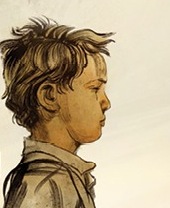The worst part of the writing process is the blank screen, the white paper, the emptiness, the limitless possibilities. The best is revision. Once I’ve scribbled a few words, I’m onto something, and when I let myself revise those words—moving paragraphs around, deleting extraneous junk—it feels great. Like cracking a Sudoku puzzle. Hahaha. (No, really.)
These days, I’m deep into revisions on a new novel and my manuscript is a mess. I love working on it, although I often wish it wouldn’t take so long. I decided to look back at an early version of Brotherhood to remind myself just how far that novel came—how bad it was early-on, and how much it improved. This gives me hope. Here’s the 2009 version of my opening scene:
 Bam, bam, bam, bam, bam. Somebody is banging. Bam, bam, bam. Somebody is banging so hard the walls are rattling.
Bam, bam, bam, bam, bam. Somebody is banging. Bam, bam, bam. Somebody is banging so hard the walls are rattling.
“Mrs. Weaver?” a man shouts.
My head hurts. I open my eyes. I’m in my bedroom. The light is early. A chicken squawks. Peep-peep, is that you? Jeremiah is stretched out asleep in his britches.
“Open up! Official business of the government of the United States. Open up!” The voice is flat and nasal. It’s not from around these parts. It’s Yankee.
I hear shuffling in the house. Mama is up. Peep-peep and Poke are squawking. Shoot. Is somebody hurting our chickens? I should check on the chickens. I roll off the mattress. I run to the windowsill. I am not awake. Am I awake?
“Shoot!” I cry.
There’s a boy looking in my window! He’s wearing blue. Blue cap. Brass buttons. Blue uniform. Musket on his shoulder. “Going somewhere, Mr. Weaver?”
Ouch. Cringe-worthy. Choppy. This version repels me more than it engages me. While I like the way I was able to get inside the head of this character, I feel irritated by that closeness. As a reader, I don’t want to stay inside this head for three hundred plus pages.
Here’s the revision, completed in 2011 and published in 2013:
 The first sound Shad heard was the squawk of a chicken. Then the thud of a fist on wood. Bam. Bam. Bam. The hollow walls rattled. A man’s voice. “Mrs. Weaver?”
The first sound Shad heard was the squawk of a chicken. Then the thud of a fist on wood. Bam. Bam. Bam. The hollow walls rattled. A man’s voice. “Mrs. Weaver?”
The light was early yet, and Shad glanced beside him. His older brother lay asleep there in his trousers—right there on top of the white cotton ticking. Hadn’t even changed into a nightshirt. Shad nudged Jeremiah’s shoulder and heard his brother grunt, but he didn’t wake.
The thud came again. Bam. Bam. “Mrs. Weaver? Official business of the government of the United States. Open up!” The voice was flat and nasal—not Virginia-born.
Shad nudged Jeremiah harder this time, but still his brother didn’t rouse. He rolled off the straw mattress, feet on cool dirt, and headed for the window. But at the sill, he jumped back. “Lord!”
There was a boy maybe Jeremiah’s age—seventeen—maybe a tad more—blond like Jeremiah. He stood on the other side, only inches from Shad’s face. Navy blue cap. Blue uniform. Brass buttons. Musket on his shoulder. He said, “Going somewhere, Mr. Weaver?”
Notice that I added details to ground the reader in the setting. I revised from first person, present tense to third person, past tense, pulling the reader out of the protagonist’s head, and providing a welcome distance while staying true to the character. I slowed the scene down.

My publisher never saw that early version of Brotherhood. Before I queried agents, I’d already revised the whole shebang, adding details, changing tenses, cutting some scenes and digging deeply into others. I had help doing it, thanks to the MFA program at Vermont College of Fine Arts. Instead of telling me to shelve the manuscript because it was so bad, my 4th semester faculty advisor, Kathi Appelt, taught me how to approach revisions, how to dig deeper, how to turn a mess into a novel.
Re-reading my bad early version makes me feel good. Encouraged! My current WIP is messy, but it’s coming along. If I didn’t love the process, I wouldn’t keep going. But I do love it. I live for it. Spending my mornings writing fiction keeps me sane through my afternoons and evenings. And when I have something to work with—something to fix rather than starting from scratch—that’s the best of all.

Thank you! I will share this with my writer’s group……revision just feels like so much work. But, you are right….better than the blank screen!
Yes — it is SO MUCH work, isn’t it? But so worthwhile…
So enjoyed reading this today. I experience this nearly every day at work. After 30 years of writing “science to readable” pieces, I know now that the best thing to do is just start…let any words flow…a dumping of thoughts, mostly randomly. Somehow, the words come together during reviews and repeat readings – I’ll see a thought that jumps out – and more often than not it becomes the leading edge sentence and things develop from there.
My first draft is always a dumping of thoughts. And finding a lead sentence in the mess? So true! I wish I’d understood years ago that random dumping is part of the process, but for decades I just thought I couldn’t write well. Now that I’ve learned to embrace the revision process, writing still isn’t easy. But it comes together. I admire people who can make science readable for those of us who aren’t in the field. Thank you!
Thanks for showing us this early draft. Your early draft looks like some of my finished ones. Sigh. I’ve begun to have more appreciation for the revision stage. It helps me to refine the story that I discovered during the first draft.
It’s a real eye-opener to look at early drafts. And then there are the scenes I cut out of the book entirely — scenes I never revised. Talk about bad writing there! Ugh. You used the word “refine.” Yes! That’s it, exactly.
Like you, I much prefer the revision stage than the blank page. Getting started is sooo hard. Thank you for sharing the before and after of the beginning of Brotherhood. I can see how it was important to write the first draft in first person to get inside Shad’s head but to switch for the little bit of narrative distance that allows you to portray the character in more depth. That’s especially effective for Shad, who doesn’t have the language or perspective yet but starts to develop it in the course of the story.
Thanks for your perspective, Lyn. Drafting Shad’s story in first-person-present really helped me connect with him as a character. In general, I think FPP is fabulous for the drafting stage but jarring on the page. When I switched from FPP to third-person-past, I lost the sense of immediacy that comes with FPP. Instead of finding immediacy via the verb tense, I managed to create a sense of urgency through the plot and an “in media res” opening. I also used short, tight sentences where appropriate, and they add some punch. But it was a lot of work! When I think back on how much revision went into Brotherhood, I’m amazed that I ever got it done.
Gives a very great view into the process of revision and drafts. I love it. Thank you so much!
I hope it helps you with your own writing! It’s such a process, isn’t it? So much work, but so fulfilling…